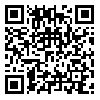1. Rezayi AM, Jahan F, Rahimi M. Academic performance: the role of achievement goals and achievement motivation. Educational Psychology. 2017;12(42):155–71. [Persian] [
Article]
2. Pham LB, Taylor SE. From thought to action: effects of process-versus outcome-based mental simulations on performance. Pers Soc Psychol Bull. 1999;25(2):250–60. [
DOI]
3. Pekrun R. The control-value theory of achievement emotions: assumptions, corollaries, and implications for educational research and practice. Educ Psychol Rev. 2006;18(4):315–41. [
DOI]
4. Wu C, Jing B, Gong X, Mou Y, Li J. Student's learning strategies and academic emotions: their influence on learning satisfaction during the Covid-19 pandemic. Front Psychol. 2021;12:717683. [
DOI]
5. Anderson KL, Weimer M, Fuhs MW. Teacher fidelity to conscious discipline and children's executive function skills. Early Child Res Q. 2020;51:14–25. [
DOI]
6. Zhao T, Fu Z, Lian X, Ye L, Huang W. Exploring emotion regulation and perceived control as antecedents of anxiety and its consequences during Covid-19 full remote learning. Front Psychol. 2021;12:675910. [
DOI]
7. Altuwairqi K, Jarraya SK, Allinjawi A, Hammami M. A new emotion–based affective model to detect student's engagement. J King Saud Univ Comput Inf Sci. 2021;33(1):99–109. [
DOI]
8. Brando-Garrido C, Montes-Hidalgo J, Limonero JT, Gómez-Romero MJ, Tomás-Sábado J. Relationship of academic procrastination with perceived competence, coping, self-esteem and self-efficacy in nursing students. Clinical Nursing. 2020;30(6):398–403. [
DOI]
9. Abbasi HR, Mahdinezad V, Shirazi M. The study of evaluate the effect of teaching the Jig-Saw technique on improving academic performance among enterning students university stuyding educational sciences at Farhangian university in Sistan and Baluchestan province in 1395. Journal of Educational Psychology Studies. 2019;16(33):97–116. [Persian] [
Article]
10. Naki E. Determining the effect of reducing procrastination tendency on the academic achievement in physics course. International Journal of Educational Administration and Policy Studies. 2019;11(1):1–11. [
DOI]
11. Komlosi-Ferdinand F. Academic emotions and emotional validation as motivating and demotivating factors in the ESL classroom: a mongolian case study. REIRE. 2020;13(1):1–21. [
DOI]
12. Fani Sh, Zolfi V, Karimi M. The effectiveness of teaching emotion regulation strategies in the components of academic procrastination and the components of academic performance of girl high school students. Educational and Scholastic Studies. 2022;11(1):255–78. [Persian] [
Article]
13. Jaremka LM, Ackerman JM, Gawronski B, Rule NO, Sweeny K, Tropp LR, et al. Common academic experiences no one talks about: repeated rejection, impostor syndrome, and burnout. Perspect Psychol Sci. 2020;15(3):519–43. [
DOI]
14. Ge X. Emotion matters for academic success: implications of the Article by Jarrell, Harley, Lajoie, and Naismith (2017) for creating nurturing and supportive learning environments to help students manage their emotions. Educ Technol Res Dev. 2021;69(1):67–70. [
DOI]
15. Pekrun R, Lichtenfeld S, Marsh HW, Murayama K, Goetz T. Achievement emotions and academic performance: longitudinal models of reciprocal effects. Child Dev. 2017;88(5):1653–70. [
DOI]
16. Hayat A, Esmi K, Rezaei R, Nabiee P. The relationship between academic emotions and academic performance of medical students of Shiraz university of medical sciences. RME 2017;9(4):20–9. [Persian] [
Article]
17. Jalilzadeh H, Zarei HA. The effect of self-regulation strategies on academic motivation and test anxiety in students. Journal of Education and Evaluation. 2018;11(42):13–36. [Persian] [
Article]
18. Delavar A. Educational and psychological research. Tehran: Virayesh Pub; 2015. [Persian]
19. Vallerand RJ, Pelletier LG, Blais MR, Briere NM, Senecal C, Vallieres EF. The academic motivation scale: a measure of intrinsic, extrinsic, and amotivation in education. Educ Psychol Meas. 1992;52(4):1003–17. [
DOI]
20. Mohammadali S, Manavipor D, Sedaghatifard M. Psychometric properties of the student version of the academic motivation scale. Applied Psychology. 2020;14(4):415–34. [Persian] [
Article]
21. Saffarieh M, Rezaei AM, Mohammadifar MA. Evaluation of validity and reliability of Pham and Taylor academic performance questionnaire (1999). Educational Development of Judishapur. 2022;13:1–15. [Persian] [
Article]
22. Rahmati N, Abolma'ali Alhosseini K, Mirhashemi M. Factors affecting the academic emotion of female students of the first secondary school: a qualitative study. Rooyesh. 2023;12(4):85–94. [Persian] [
Article]
23. Tajipour A, Janjani B, Habibi M, Ahmadi M, Karbalaei F. The effect of self-regulated education strategies on self-efficacy, test anxiety and achievement motivation of third grade female high school students in Mashhad. Instruction and Evaluation. 2020;12(47):67–92. [Persian] [
Article]






